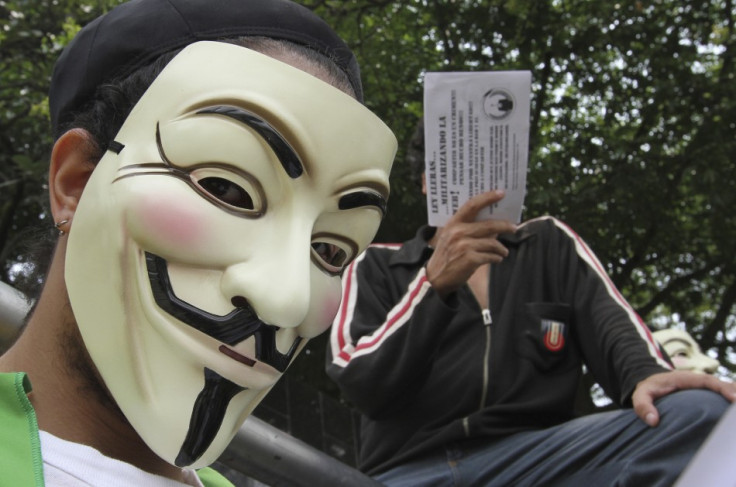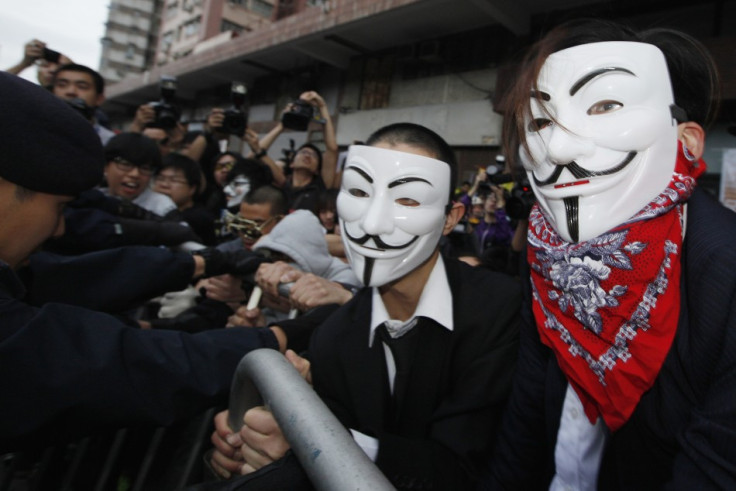Who is Anonymous?
The annual Time Magazine list of the 100 Most Influential People in the World is always an interesting and disparate group. Where else would you see Barack Obama rub shoulders with the likes of Lionel Messi, Rihanna, Pippa Middleton and Chinese philanthropist Chen Lihua?
While the technology world is well represented by the likes of Apple CEO Tim Cook, Spotify founder Daniel Ek, Mashable founder Pete Cashmore and Facebooks's chief financial officer Sheryl Sandberg, there is one representative a lot of the technology community would rather not see present, and that is the hacktivist collective known as Anonymous.
Beating Facebook's Mark Zuckerberg, Amazon's Jeff Bezos and Microsoft's Steve Ballmer to a place on the list, the presence of the group highlights just how pervasive its actios have become in the last 12 months.
Sustained attacks on high profile websites and networks has seen Anonymous make its way onto the front page of newspapers around the world and become well known for their anarchic sensibilities and ability to circumvent the security of high profile targets like the FBI and the US Military as well as commercial enterprises like Sony.
But just who are the members of Anonymous and why are they on Time's list?
According to the entry in Time's list, Anonymous is a "leaderless Internet hive brain" which is targeting an ever-shifting group of targets from the Pope, to entertainment firms like Sony, to high profile targets like the FBI and CIA, and even San Francisco's BART public transport system.
Anonymous has been around as an internet meme since 2003, beginning in the chatrooms of 4chan, however it wasn't until 2008 and Project Chanology which targeted the Church of Scientology that the group came to the attention of the wider public.
Whether members have to actually join the collective is unknown, but it is believed that by simply aligning yourself with the group's beliefs and actions, then you are assimilated and become an Anon, as members are known. As a result, putting a number of the membership globally is impossible as some 'members' are much more involved than others.
While Anonymous is an umbrella group for online activists the world over, subsets of this collective have emerged with some of the more prominent in recent times being LulzSec and TeamPoison. While these groups have their own agenda, they are still operating as members of Anonymous and if they ever do something which is not aligned to the groups beliefs, they are quickly put in their place.
Attacks carried out by Anonymous vary from Distributed Denial of Service (DDoS) attacks, which overwhelm a website's servers and crash the site for a period of time; to the publication of sensitive information which could cause a national security risk such as the Stratfor leaks.
Anonymous came to widespread attention in 2011 when they exponentially increased the number of attacks they carried out, with the LulzSec group carrying out 50 seperate attacks in as many days. Other members of Anonymous have taken up the baton from LulzSec and continued the attacks into 2012.
Alleged Anonymous members have been arrested in a large number of countries around the globe including the US, UK, Ireland, Australia, Spain, Columbia, Argentina and Chile which suggests they are a truly global organisation. There is a perception that the members of Anonymous are mostly very young but a number of members of the collective have denied this at various times over the last 2007.
One of the best ways we have of understanding just who Anonymous members are, is by looking at the members who are arrested.
Last month, one of the biggest blows to the Anonymous collective was the revelation that one of its most prominent members, known as Sabu, had been working as an informant for the FBI for the previous six months.
Sabu, aka Hector Xavier Monsegur, was a 28-year-old of Puerto Rican descent, who the New York Times branded as the "party boy of the projects." At the time of his arrest, Monsegur was raising two young children belonging to an imprisoned aunt, paid bills with stolen credit cards and dabbled in drugs - when he wasn't trying bring down the governments of Zimbabwe and Algeria that is.
As a result of Sabu's snitching, five members of the LulzSec group were arrested in the UK, Ireland and the US, with four of them accused of launching DDoS attacks against the CIA and the UK's Serious Organised Crime Agency (SOCA). All those arrested were young men under the age of 30, including one, Jeremy Hammond (aka Anarchaos), who is believed responsible for the cyber attack on US-based security firm Stratfor.
Two Irish men arrested, Darren Martyn (also known as pwnsauce) and Donncha O'Cearrbhail, (also known as palladium) are 19-year-old university students, neither of whom had any previous convictions for crimes of this nature and one, O'Cearrbhail who's father was an elected politician. Ryan Ackroyd, (known online as kayla) is a 25-year-old from Doncaster while Jake Davis (or Topiary), lives on the Shetland Islands and had been previously investigated on separate charges relating to LulzSec activities.
It is clear that a lot of the people involved in Anonymous are young men with no previous criminal activity. However there seems to be a hierarchy at work here, with older members like Monsegur and Hammond directing the rest of the group.
While Anonymous may state that it's in it for the lulz, an internet meme meaning "for the laughs", Sabu was using stolen credit cards to pay his bills and it is suspected that more Anonymous members are using similar, less idealogically sound measure to boost their finances.

So why have they been listed on Time's list of 100 most influential people in the world?
While Anonymous as a collective have come to the forefront of people's attention in the last 12 months, one of the main reasons it is on the list is because it won a public vote which Time held prior to announcing the final list.
While topping this poll did not guarantee a place on the final list, it would have seemed odd if Anonymous was left out. As the poll was conducted through Time's website, there were claims from some quarters that Anonymous had 'influenced' the results in an irregular manner.
The entry on Time's official list website for Anonymous asks the very same question, quoting an unknown source as saying: "Depends who you think is smarter, a global collective of highly skilled hackers or the TIME IT department."
Time did report at the time that during the week long poll, Anonymous jumped from third place and 40,000 votes to first place and almost 400,000 votes in the final 24 hours.
Whether or not the collective did influence the poll, edging out Erik Martin, the general manager of Reddit.com in the process, seems unimportant. The real question is, would Anonymous have been on the list if there was no public poll.

There is no doubt that Anonymous influenced a lot of people around the world, though for the most part, this influence is not voluntary. People are affected by the actions of Anonymous. This could be through the websites they are trying to access being attacked and taken offline, or worse, their personal information (inlcuding email, addresses, telephone numbers) has been plastered all over the web for all to see.
Anonymous has a high-minded belief that what they are doing in uncovering the corrupt and evil people running governments around the world is a worthwhile cause, but in reality a lot of the time those affected are not the real targets of the attack but bystanders caught up in a bigger argument.
With attacks on the CIA, Sony, SOCA, the FBI, and many, many other targets, Anonymous has certainly entered the public's consciousness, but what we need to ask is what has it achieved in doing so. Besides upsetting a lot of people and pointing out that some governments are corrupt - which is nothing we didn't know already - the group has done very little of any value.
Wired
© Copyright IBTimes 2025. All rights reserved.






















